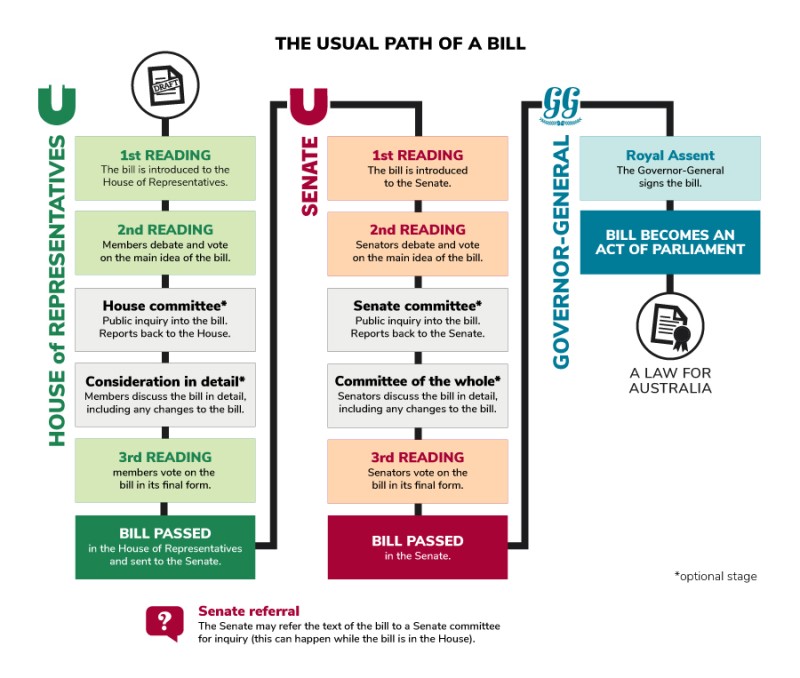How long does it typically take to pass a bill from start to finish?
The usual path of a bill

Parliamentary Education Office (peo.gov.au)
Description
The usual path of a bill through the Australian Parliament to become Australian law.
In the House of Representatives a bill goes through the following stages:
- 1st reading – the bill is introduced to the House of Representatives
- 2nd reading – members debate and vote on the main idea of the bill
- House committee (optional stage) – public inquiry into the bill and reporting back to the House
- Consideration in detail (optional stage) – members discuss the bill in detail, including any changes to the bill
- 3rd reading – members vote on the bill in its final form
- the bill is passed in the House of Representatives and sent to the Senate.
Senate referral – the Senate may refer the text of the bill to a Senate committee for inquiry (this can happen while the bill is in the House).
In the Senate a bill goes through the following stages:
- 1st reading – the bill is introduced to the Senate
- 2nd reading – senators debate and vote on the main idea of the bill
- Senate committee (optional stage) – public inquiry into the bill and reporting back to the Senate
- Committee of the whole (optional stage) – senators discuss the bill in detail, including any changes to the bill
- 3rd reading – senators vote on the bill in its final form
- the bill is passed in the Senate.
The bill is given Royal Assent – The Governor-General signs the bill.
The bill becomes an Act of Parliament – a law for Australia.
This work is licensed under a Creative Commons Attribution-NonCommercial-NoDerivs 3.0 Unported License.
You are free to share – to copy, distribute and transmit the work.
Attribution – you must attribute the work in the manner specified by the author or licensor (but not in any way that suggests that they endorse you or your use of the work).
Non-commercial – you may not use this work for commercial purposes.
No derivative works – you may not alter, transform, or build upon this work.
Waiver – any of the above conditions can be waived if you get permission from the copyright holder.
Thanks for your question, Jess. It can take weeks or even months for a bill – a proposed law – to pass the Australian Parliament. However, an urgent bill can be passed in a matter of days. Once the Parliament passes a bill, it must be given Royal Assent – signed into law – by the Governor-General.
The time it takes for a bill to progress in Parliament can be impacted by:
- how many members of parliament and senators want to speak about the bill
- how complex the bill is
- if members or senators suggest amendments – changes – to the bill
- if either house asks a committee to investigate the bill in detail and report back with any recommendations
- how many other bills the Parliament is working on.
Some debates can take less than 2 hours, while others may continue for over 50 hours – spread across many days, weeks or even months.
For example, the Criminal Code Amendment (Food Contamination) Bill 2018 – sometimes referred to as the ‘Strawberries Bill’ – was debated, voted on and agreed to by both the Senate and House of Representatives on the same day.
One of the longest debates was on the Native Title Amendment Bill 1997 which was debated for over 56 hours in the Senate.
